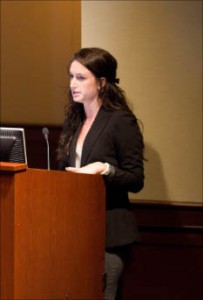
By Daniel Weinshenker
Correspondent
Every year thousands of Americans travel to the Central American country Nicaragua, to volunteer and try to relieve some of the economic and political turmoil that consumes the country.
On Tuesday Sept. 28 in the Library Auditorium, seven Bonnor Scholars gave a presentation about their summer service project in Nicaragua. The group was in Nicaragua from June 28 to July 8, and during those 10 days the Bonners met with farmers, workers and villagers. They listened to their stories and heard their perspectives.
The Bonners learned about Nicaraguans’ every day life and the country’s severe financial troubles, some of which the speakers felt that the United States was responsible.
“Nicaragua is the largest country in central America, but the second poorest nation in the Western Hemisphere behind Haiti. A lot of the issues are directly related to the United State’s policy towards the country,” Ashley Covello, junior Bonner Scholar and marketing major, said.
The presentation began with an introduction from Covello on an overview of their trip, a slideshow of pictures and more information on the Bonner Scholars program. It then segmented into a summary of the country’s history from Rana Shariatdoust, Bonner Scholar and junior economics and political science major.
Shariatdoust explained that the United States has had a large presence in Nicaragua since 1909. They have had many interventions and occupations throughout its history. Two major events that Shariatdoust cited as causes for the country’s current condition were a terrible earthquake in 1972 and the civil war during the ’80s.
“During the 1960s, the Somoza family took over the country’s both politics and economy and there was large growth and industrialization during this period so many people overlooked the corruption,” Shariatdoust said. “However once the earthquake hit in 1972, 90 percent of the city, Malaga, was destroyed and the Somoza family kept all of the foreign aid and did not reinvest it into the country. This led to the Sandinista Rebellion and eventually a brutal civil war.”
She then went on to discuss that although the civil war is over there are still large amounts of corruption so the country is in the same state that it was in the ’80s.
The story behind the country’s financial troubles was explained by Lire Botes, Bonnor Scholar and junior business administration major. Botes also furthered the idea that the United States has a profound impact on Nicaragua.
“When the United States sneezes, Nicaragua catches pneumonia,” Botes said.
He said that Nicaragua is dependent on the United States, and that the American companies take advantage of the Free Trade Zones that make up 50 percent of Nicaragua’s gross domestic product.
“When American companies suffer from financial losses, they close factories and corporations, which is something that Nicaragua desperately needs, so the companies can bully local governments and they have authority in the Free Trade Zones,” Botes said.
Botes also discussed how neoliberalism economic thoughts hold back Nicaragua, as well.
Botes explained that the country receives large sums of money from institutions like the International Monetary Fund and World Bank, and they put restrictions on spending. For example, they do not allow small government deficits, so Nicaragua cannot invest money into education. All of this gives Western nations an unfair trade advantage against Nicaragua.
“Is it more humane to die from hunger than it is from bombs?” asked Botes, because he feels that the United States’ foreign policy has direct effects on Nicaragua that are so drastic as to cause hunger and starvation among its citizens.
“American companies not only affected the economy, but it also effected the health of Nicaraguans,” Fred Darlius, Bonner Scholar and senior sociology major, said.
He showed pictures of people living in Disease Control Priorities Project camps. These camps are inhabited by people who were affected by the deadly DCPP chemicals that were used by many transnational companies, like Dole, in Nicaragua. Although the use of the chemical was outlawed in 1986, the affects of its use are still felt by many.
The focus of the presentation moved towards individual’s troubles. Ashley Rodriguez, special projects coordinator for the Bonner Center, demonstrated that every day was a struggle for many Nicaraguans. Rodriguez pointed out that a majority of Nicaraguans spend about $2 a day on food for a family of six.
“We were sent to the market with $2 and asked to buy enough food for dinner for a family of six. We were astonished on how little we could get, some rice, a small amount of meat and maybe an avocado, and it made me think about all of the food that gets wasted, even here in Eickhoff,” Rodriguez said.
The presentation concluded with a summary and photos of the Bonner’s stay in the community of Ramon Garcia. There, they stayed with a family and were exposed to every- day struggles in Nicaragua. The Bonnors not only pointed out the profound hospitality that their host families had, but also the pride and perseverance of the people.
“One day we were walking and saw a light green grasshopper near the house. I pointed this out to our host mother and she became so over-joyed because this was a symbol of good luck. I then realized that every speaker in Nicaragua still had one important thing. They still had hope, esperanza,” Kathrine Avila, Bonner Scholar and senior international studies major, said.
“There, in Nicaragua, we had heart to heart connections, it was not about class, or skin color, but about the basic human needs that all of us want, like love and friendship,” Avila said.






